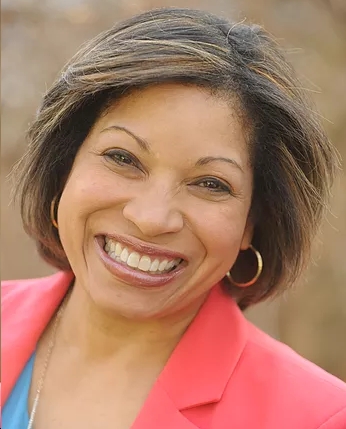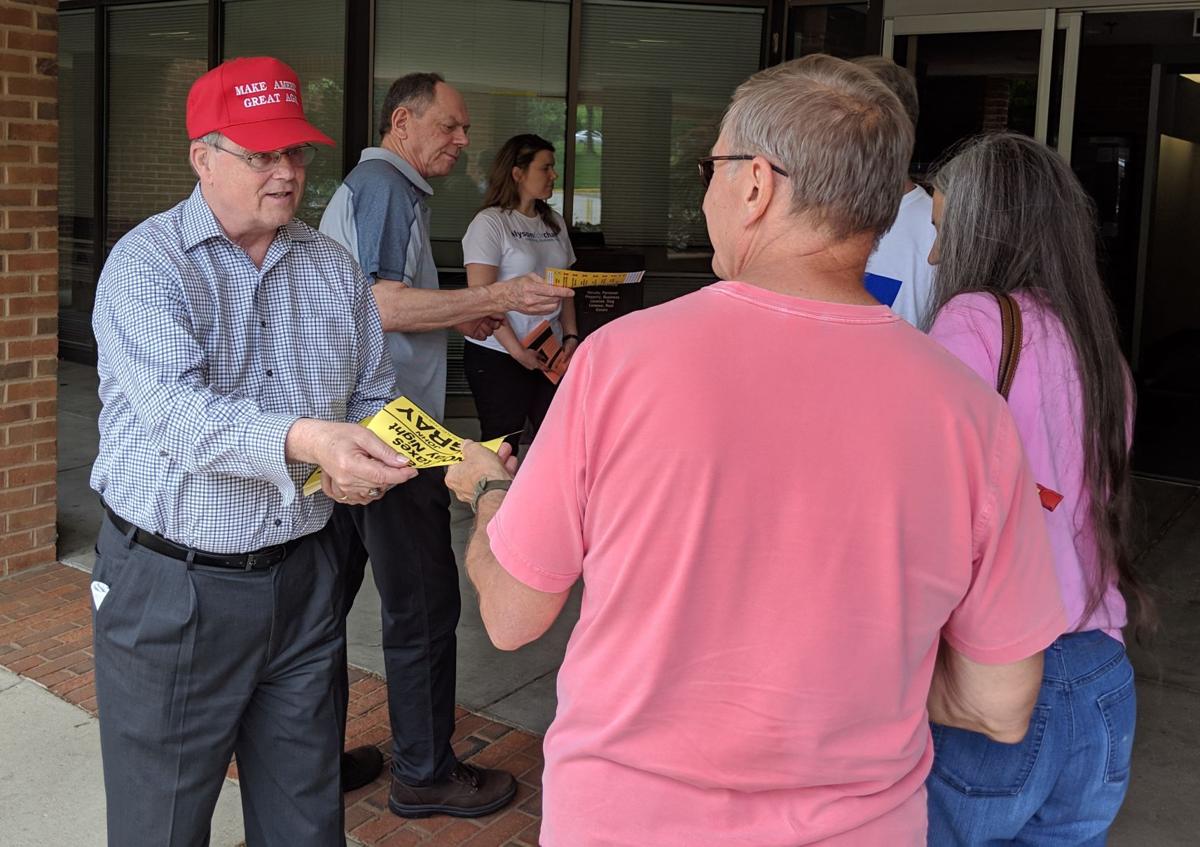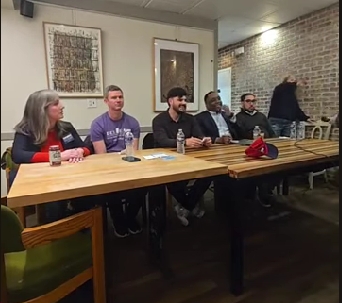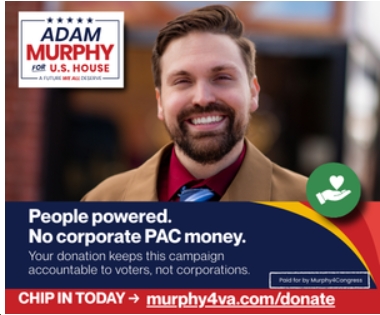On May 19, I sent all four Democratic Arlington County Board candidates Blue Virginia Qs & As and asked for responses by April 5. I told the candidates I’d post responses in the order received, which for the record was: Erik Gutshall‘s at 9:27 pm, Vivek Patil‘s at 10:10 pm and Kim Klingler‘s at 10:14 pm (the other Democratic candidate, Peter Fallon, told me yesterday that he’d have his responses back by today). Voting is on May 9 (7-9 pm at the Key Elementary School), May 11 (7-9 pm at the Drew Model School) and may 13 (11 am-7 pm at Washington-Lee High School). With that, here are Peter Fallon‘s responses (also see his kickoff video from last night, at the end of his answers).
- Tell us a bit about yourself, and specifically, what in your background and/or temperament makes you the best qualified of the Democratic candidates to serve on the Arlington County Board?
I have been described as someone “who lives and breathes Arlington.”
Local issues have always been important to me, and over nearly 30 years I’ve devoted thousands of hours to a broad range of issues in Arlington and our region. These issues have included schools, transportation, zoning, land use, affordable housing, parks and recreation, fiscal management, and public safety.
I served on the Arlington County Planning Commission for nine years, serving as chair in 2009. During that time, I chaired the zoning ordinance review committee for three years, and chaired multiple long-range planning exercises. I served as the commission’s liaison to the County’s Affordable Housing Commission. I served on the Arlington County Transportation Commission for three years, and served on the Master Transportation Plan (MTP) Plenary Group. In 2016, I served as the cochair of the school bond campaign. A more complete list of my community involvement is available on my website. FallonForCountyBoard.org
I have a reputation for giving thoughtful consideration to any matter. I’m known as a strong advocate for residents feeling shut out of the public process or who don’t have a voice. People reach out to me for help navigating our public process.
I know that reasonable people can disagree, because I focus on finding common ground. I respect the diversity of opinion on every issue in Arlington. I engage people ask pointed questions to increase my understanding, having a two way conversation. I make your issue, my issue. I get things done.
All members of the county board are elected to serve the people of Arlington. This requires each to show respect for one another and find ways to work together. I am collaborative in my approach to policy making. I take citizen input seriously.
- How would you describe yourself ideologically – “progressive,” “moderate,” “liberal,” or something else? How does your record of votes, endorsements, employment, and other activities reflect your political ideology?
Ideologically, I would describe myself as a progressive.
In the 2015 primary, there were two open seats. I was honored to be the sole endorsee of Blue Virginia for both my experience and solid progressive values.
I was also the sole endorsee of the Sierra Club in recognition of my experience and record of deep support for the environment and sustainability issues.
I was endorsed by the Washington Post and Sun Gazette newspapers, Arlington Education Association, Sierra Club, and progressive members of the General Assembly for the same reasons, my experience, commitment, advocacy, and getting things done.
Again, as someone who “lives and breathes Arlington,” civic activism has long been my “hobby.” There is saying about “do what you love.” Well, I love Arlington and working with others to make our community even better.
I have the strongest record of advocacy among the candidates in supporting affordable housing, social services, public schools, standing up to developers, supporting smart growth, and transportation. This is well documented in Planning Commission records and public statements. As an advocate I take your issue, and make it my issue too.
Politically, I have been an active member of the Arlington County Democrats. I’ve served as a precinct captain, area chair, social media co-chair, and actively involved in many local and state campaigns.
- Who is your favorite and who is your least favorite Arlington County politician, present or past, and why?
My favorite would former Arlington County Board member James B. Hunter, who dedicated many years to helping underserved groups access government services designed to protect their rights. Following his death, Arlington County created the James B. Hunter Award, which goes to individuals, community groups, non-profit organizations and business establishments that promote cultural diversity and equal rights for all residents.
Early in my civic career, I was the elected president of my civic association. I reached out to all of the then county board members to represent my community on a variety of controversial issues. I found Jim to be very accessible, empathetic, and focused on helping people with the public process. He had a reputation for being concerned with “individual rights.” He was a friendly ear on the county board for many people without “insider access.” The need for this role still exists, now more than ever. For decades, people have reached out to me for help navigating the public process. This has been the most personally satisfying aspect of public service to me—helping others to gain a voice.
Least favorite local politician? Well, I’ve interacted with probably every local politician over the past 30 years. Some, I’ve gotten along with better than others. However, I have respected each of them for having won elected office. Generally, I am least impressed by electeds that don’t reach out to the broader community, are inflexible or indecisive. County Board members are elected to lead and make decisions. All should do this in the best interests of our community and its future.
- As a County Board member, what would your approach be to improving housing affordability in Arlington? Would your emphasis be more on providing subsidies for dedicated “affordable housing” units, more on increasing the supply of housing via zoning and other changes, or some other method(s)?
I am proud of my record of actively being part of efforts to build over 1,000 units of actual affordable housing. My commitment to expanding affordable housing at different income levels and for different segments of the community is unchanged.
Broadly speaking, we need to step up our game on implementing the county’s affordable housing master plan. I have long advocated reconvening the housing roundtable. This working group provided the basis for what is today our affordable housing ordinance. This ordinance requires developers seeking more density in the Metro corridors, to either set aside onsite units as affordable, or contribute to the county’s affordable housing investment fund (AHIF). These contributions are then loaned to our housing nonprofit partners to build long-term committed affordable units (CAFs). The housing ordinance needs to be updated to reflect current conditions and give us the resources to get more CAFs I would update the affordable housing bonus density provision and the transfer of density (TDR) ordinance to create more units, and to encourage wider geographic distribution of CAFs across Arlington. I support giving first priority for CAFs to current county residents, first responders and APS teachers.
We need to revisit the accessory dwelling unit provisions in the county’s zoning ordinance, and create new options for safe housing.
- Given the potentially draconian cuts we could see in coming months and years from the Trump administration and Republican Congress, what could/would you do to protect Arlington in general, and Arlington’s most vulnerable residents specifically?
I am the son of two immigrant parents. I am the first member of my family to be born in the US. As a child in New York City, my family’s friends included survivors from Auschwitz and other concentration camps. When I was about 7 years old, I asked my mother why her friend, Mrs. Greenglass, had numbers tattooed on her arm. While young, I was giving a quick history lesson about evil in the world, and what happens when people don’t speak up for others.
Now we find ourselves facing growing threats in our own country. I oppose efforts to deputize our local police to serve on behalf of ICE agents. I oppose the presence of ICE agents in our schools and county jail.
The county board and school board have both issued public statements emphasizing that Arlington and our schools are welcoming and safe places. This is a great first step. However, we must, as a community, have an action plan ready to defend our neighbor’s constitutional rights, for the time when public statements aren’t enough. To that end, I am committed to lobbying state and local officials to protect others.
In the face of proposed cuts to federal and state social programs, Arlington will need to step up and help people in our community even more. We have been most successful in helping people by coordinating services between the local government and our nonprofit partners. This requires that we streamline county processes hindering delivery of services, and find ways to increase funding allocations.
Arlington has long relied upon our network of nonprofit human service providers to provide direct assistance to the most vulnerable in our community. These organizations have extensive volunteer and donor networks. They are able to provide services more cost effectively and efficiently than the County could do alone. I am committed to helping our community organizations to help our community.
- As you know, Virginia is a strong “Dillon Rule” state. How best can Arlington operate within these constraints in order to “push the envelope” on progressive and pro-environmental policies while not getting slapped down by a Republican-controlled General Assembly?
I have long believed that the Dillon Rule creates unreasonable restrictions on the ability of local governments to solve our own problems. As long as our region and our Democratic party are outnumbered in the General Assembly, I don’t see any meaningful improvement in the relationship.
Arlington has been successful in obtaining authority from the General Assembly. In the past session, limitations on the salaries of school board members were lifted to bring them in line with the rest of the state.
The General Assembly can pass legislation that only applies to Arlington County, by limiting authority to counties using the county manager form of government. Arlington is the only jurisdiction to which this applies. In the past, our affordable housing ordinance and our transfer of density (TDR) authority were approved in this manner. Of course, Arlington lost our ability to levy a transient hotel occupancy tax, which was used for promoting tourism. This was rescinded in retaliation for Arlington’s lawsuit on I395 expansion. We will continue to get slapped down, until we replace these members. Until then, we need a Democratic Governor, Lt Governor, and Attorney General to block hateful legislation and its applicability.
Arlington and northern Virginia is the economic engine of our state. Virginia benefits from income tax transfers to other parts of the Commonwealth.
I look to our Delegates and State Senators to represent Arlington’s interests in the General Assembly. Working with our state delegation, we need a strategic approach to legislative priorities, leading to more local authority. We need to stop making excuses for the limitations of the Dillon Rule, and work towards acquiring the tools needed to best serve Arlington. We must elect Democrats in 2017 for Governor, Lt. Governor and Attorney General. The DPVA and ACDC must work to electing more Democrats throughout Virginia.
More people are moving to the urban areas of Virginia. We must work to ensure that the next round of redistricting will empower us by electing more Democrats to the GA.
- What is your position on adequate funding for Metro? Would you support a dedicated revenue source? Increasing Arlington’s contribution to Metro? Other options?
Metro is the cornerstone of Arlington’s transportation system. Decades ago, we bet our economic future on the success of Metro. Our land use plans have all been developed in the context of Metro service. We must take all the necessary steps to make Metro safe, dependable, convenient and affordable for riders.
Due to deferred maintenance and aging infrastructure, more funding for Metro is essential. While I hold out hope for higher contributions from the Federal and state governments, I recognize that Arlington will need to contribute more. I am steadfast in my belief that each local jurisdiction should pay fairly. I do not support increasing fares while at the same time reducing service or operating hours. A dedicated revenue stream will be needed. While I am generally opposed to regressive sales taxes, a minor increase levied across the DMV region may be an option. Another option (requiring state approval) would be to allocate a portion of the I66 toll receipts or VA gas tax, to Metro and ART service.
- Arlington officials like to refer to the county as an “urban village.” Is your long-term vision for Arlington to move in a more “urban” direction, to remain more “village”-like, or what?
Arlington’s land use policies have long sought to balance the “urban” (higher density, high-rise development) from the “village” scale closer to the single family neighborhoods. Density opportunities exist near the Metro stations, and this development should be concentrated around access to transit and other services. Pressure is being placed on “edge areas” further from the immediate Metro station due to lower land cost. Any development in these areas must be part of a transition zone.
We must continue to respect the scale of the surrounding community when considering development proposals. What makes sense for Rosslyn or Ballston would likely be out of character with Columbia Pike or Lee Hwy.
- Given development pressures and the lack of strong environmental protection laws in Virginia, how would you protect – and preferably enhance/increase! – Arlington’s tree canopy, streams, natural areas, parks and biodiversity?
In the 2015 primary, I was honored to be the sole endorsee of the Sierra Club. I have long supported, and helped to develop, Arlington’s environmental, energy, and sustainability goals.
Continue targeting density around the Metro stations, and limit infill development.
Open space acquisition- we need to protect our natural spaces and we need more park space for our citizens. I will push for strategic land acquisitions.
Conservation easements on private property help to protect natural spaces for future generations. This is done with private land, and there are valuable state tax incentives to encourage participation.
Reduce storm water runoff and other efforts to prevent stream contamination, including greater use of pervious paving materials, rain barrels to provide a source of water for irrigation.
As mentioned earlier, efforts to encourage use of energy generated by renewable sources, and less reliance upon electricity from fossil fuel fired power plants.
Kitchen composting- via regular count trash pickup.
Expand our E-Care hazardous waste disposal system. This successful program allows Arlington residents to safely dispose of old paint, chemicals, and electronics.
- How would you define the concept of an “Arlington Way?” Does this actually exist or it mostly just rhetoric? How well (or poorly) do you think it’s been working in recent years, and what changes would you propose moving forward to strengthen it?
The term “Arlington Way” refers to our unique civic engagement model. This allows residents to participate in local decision-making. Residents can contribute their time, talent, and expertise to the community to help shape policy and outcomes. It allows ideas to be vetted in the community, solutions identified, and common ground. Stakeholders can directly impact thing that will affect them.
Over the past decade, the Arlington Way has not performed too many citizens’ expectations. The process is very time intensive and relies upon many public meetings. Most people don’t have the available time to commit to the process, and as a result are often unheard or unrepresented. There is a common cynicism expressed by some residents that the membership of task forces is used to directly impact the outcome. Needs to bring in new faces and ideas, currently too exclusive because of time commitments. Should respect different opinions.
AC has made use of surveys and online tools to get input, but still needs to do a better job of incorporating feedback into the process. Hard to get into the process after it starts.
I am impressed by the practice adopted by the JFAC. The JFAC has been holding meetings throughout different parts of Arlington County. They have also held meetings on weekdays and weekends, which helps people otherwise unable to participate in weeknight meetings.
- What do you think the current Board is doing well? What do you think it needs to improve on? Are there any areas where the Board is doing poorly? How would you propose fixing what’s not working well?
I think the Board is doing a much better job of holding work sessions with the school board.
I think the Board should continue to work on better communication with the community and transparency. I support the 72 hour rule for providing the public with board documents.
I believe the Board should take steps to better manage growth. For many years, we added population, but did not significantly increase our supply of parks and open space, schools, and other infrasture. On the transportation side, I don’t see the transit plans for Columbia Pike and the Lee Highway corridor as being able to accommodate population growth. The JFAC process will be very helpful, but we must be open to acquiring strategic land acquisitions now. I would reinstitute walking town meetings throughout Arlington.
- What ever happened to the proposed Long Bridge Park aquatics and fitness facility, and do you support moving ahead with it?
I served on the county’s Long Bridge Taskforce. I am proud of our success in converting a former brownfield into soccer fields, esplanade, playgrounds and rain garden. The need for an aquatic facility continues and Arlington voters have approved bond referendums for construction. I share the view of the current county board members, which is that the facility will need to be built with existing funds. This will require a building redesign, but I seek to maintain the program of uses as planned. I support acquiring additional park and open space, and renovating aging recreation centers such as Lubber Run CC. Our current and future residents need these amenities.
- What would you propose to jumpstart Arlington’s Initiative to Rethink Energy (AIRE)? More broadly, how can we move Arlington to a clean energy-powered county as rapidly as possible?
AIRE is now celebrating its 10th year. An important component of AIRE is about educating our community on environmental and energy matters. This has without question in my mind contributed to the receptiveness of these principles in Arlington. On a personal level, AIRE was directly responsible for getting me to use only CFL’s and then LED lighting in my home, and the use of energy star appliances. The AIRE initiative needs to continue.
The residential utility tax supports our AIRE program, and adds only a nominal charge to the average family’s energy bill. This fee has not been increased in almost a decade. Additional funds could be generated by increasing this tax rate, or by increasing the current $3 monthly cap. In the aggregate, these funds can provide a revenue stream for new efforts within AIRE and the CEP.
I believe Arlington must join the growing list of communities working towards this goal. Our community’s commitment, coupled with our CEP, makes achieving this goal very attainable. I am very interested in developing incentives and other tools to bring about real change. I want to expand the use of renewable energy not only in new high density development, but also in the single family neighborhoods. We can expand the use of solar coops; make changes to our LEED bonus density ordinances, among other things. Arlington needs to lead by example with our schools and other public buildings.
As we begin to plan for the future of the Lee Hwy Corridor, I would like to create an energy efficient/renewable energy zone. This could be part of the vision for the corridor and “branding.” In other words, use this planning opportunity to create an ultra-green zone, which includes using new technologies on a grand scale. For example, let’s consider how we could use solar electric panels on building curtain walls, green landscape roofs to reduce the heat islands, but also provide greenspace for residents. I am interested in the use of reclaimed materials in construction, and biofuel or electric powered buses. I want to encourage this county-wide, but am suggesting that the Lee Hwy corridor provides a unique opportunity to create a flagship energy district.
Further, Arlington’s location within the National Capital Region provides opportunities for Arlington to be a true regional leader on this and other environmental issues. This will make our region national leaders, and influence other parts of the US in the coming decades. Communities like ours need to take leadership roles to influence the national level actions.
- Anything else we haven’t covered and that you think should be?
Thank you to Blue Virginia for this opportunity to respond to many of the challenging questions facing Arlington.
To the readers living in Arlington County, I ask to be your first choice vote at the upcoming county board caucus. If I can answer any other questions, please contact me at

















